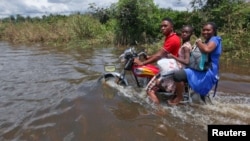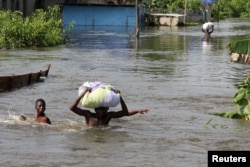ABUJA —
Last summer, Nigeria suffered its worst floods in 40 years. Hundreds of people were killed and millions more were displaced. Authorities say this year’s flooding could be just as extreme in some places, and worse in others. But many of the flood victims have not recovered from last year’s devastation.
Many parts of Nigeria are prone to flash flooding, but the scale of the suffering last year came as a surprise. As cities, towns and villages flooded, emergency services scrambled to identify the affected areas, rescue people and build makeshift camps for survivors.
Nigerian Red Cross Society spokesperson Nwakpa O. Nwakpa says many communities lost everything.
"Most of the villages affected are remote villages and poor - farmers and fisherman. Their livestock were destroyed. Their food storage was destroyed. Their houses or so were put down," said Nwakpa.
Nigeria’s National Emergency Management Agency says the country lost nearly $17 billion in property, infrastructure and economic activity from flooding.
The Nigerian Meteorological Agency says this year’s rainfalls, which have begun and will continue until September, are expected to be just as powerful. Some villages are already beginning to evacuate.
The head of the U.N. Office for the Coordination of Humanitarian Affairs in Nigeria, Choice Ufuoma Okoro, recently visited communities that are still reeling from the devastation.
“We saw communities who are still recovering. And I think the worry here is that if you have a lot of flood and you have populations that have yet to recover then it is going to be more devastating even if the flood is not as much," said Okoro.
Okoro says communities and emergency services need to be better prepared for flooding. But she says the fact that the floods are now expected may mitigate some of the damage.
For example, Nwakpa, from the Nigerian Red Cross, says many people refused to abandon their homes last year, until it was too late.
"When the water was rising they were thinking it would be as before. Maybe we do not do this [evacuate]. It will go. But the water kept rising until the villages were almost completely submerged," said Nwakpa.
He says now people know their lives are in danger so they will be quicker to abandon their properties.
Emergency management services warn that flooding will begin in July and the destruction could be swift, especially in city slums that are poorly planned with drainage pipes that are often blocked with trash.
Many parts of Nigeria are prone to flash flooding, but the scale of the suffering last year came as a surprise. As cities, towns and villages flooded, emergency services scrambled to identify the affected areas, rescue people and build makeshift camps for survivors.
Nigerian Red Cross Society spokesperson Nwakpa O. Nwakpa says many communities lost everything.
"Most of the villages affected are remote villages and poor - farmers and fisherman. Their livestock were destroyed. Their food storage was destroyed. Their houses or so were put down," said Nwakpa.
Nigeria’s National Emergency Management Agency says the country lost nearly $17 billion in property, infrastructure and economic activity from flooding.
The Nigerian Meteorological Agency says this year’s rainfalls, which have begun and will continue until September, are expected to be just as powerful. Some villages are already beginning to evacuate.
The head of the U.N. Office for the Coordination of Humanitarian Affairs in Nigeria, Choice Ufuoma Okoro, recently visited communities that are still reeling from the devastation.
“We saw communities who are still recovering. And I think the worry here is that if you have a lot of flood and you have populations that have yet to recover then it is going to be more devastating even if the flood is not as much," said Okoro.
Okoro says communities and emergency services need to be better prepared for flooding. But she says the fact that the floods are now expected may mitigate some of the damage.
For example, Nwakpa, from the Nigerian Red Cross, says many people refused to abandon their homes last year, until it was too late.
"When the water was rising they were thinking it would be as before. Maybe we do not do this [evacuate]. It will go. But the water kept rising until the villages were almost completely submerged," said Nwakpa.
He says now people know their lives are in danger so they will be quicker to abandon their properties.
Emergency management services warn that flooding will begin in July and the destruction could be swift, especially in city slums that are poorly planned with drainage pipes that are often blocked with trash.






